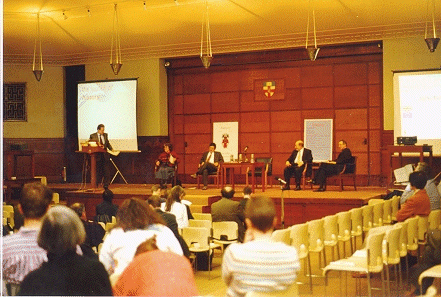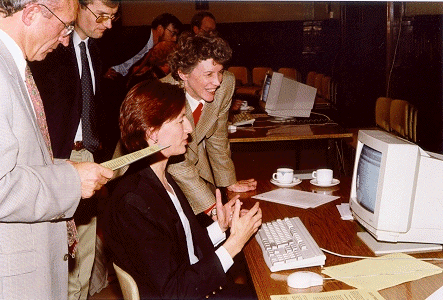The Launch of History
On a crisp All Hallows Eve, I found myself in London at the launch if History [1], the revamped and expanded ANR service [2] provided by the Institute of Historical Research (IHR) at the University of London.
The launch was more than just an excuse for tea and scones - there were five speakers and stands and demonstrations from related bodies, such as the Public Record Office at Kew [3].
 First in to bat was Dr Steven Smith, Academic Secretary of the IHR and Project Manager for History. He explained much of the motivation behind History and the IHR, likening the IHR to a 'History Laboratory' (a term used in the first annual report of the IHR) and information to chemicals and experiments as the interaction of these chemicals resulting in an end product. Integration is a challenge which the IHR and History wish to meet: cross sectorially (other historical societies and so on); between academic and commercial; pluridisciplinarily and also internationally.
First in to bat was Dr Steven Smith, Academic Secretary of the IHR and Project Manager for History. He explained much of the motivation behind History and the IHR, likening the IHR to a 'History Laboratory' (a term used in the first annual report of the IHR) and information to chemicals and experiments as the interaction of these chemicals resulting in an end product. Integration is a challenge which the IHR and History wish to meet: cross sectorially (other historical societies and so on); between academic and commercial; pluridisciplinarily and also internationally.
Harold Short of King's College, University of London, was next to speak. He was pleased to note that the web seems to mark the decline in closed systems and hopes that instead of merely storing answers, computers would be used to help ascertain which questions should be asked.
Peter Denley, a founder member of the Association for History and Computing spoke about the history of history and computing (a subject he was well qualified for)! He seemed fairly confident that 'the days of the Arts/Science divide is largely behind us' and the 'historians are even doing things which excite computing specialists! He noted that increasingly both undergraduates and postgraduates in history are taking courses on data analysis and information management and also computing which not only famliarises them with the concepts but help them work more effectively. However computers themselves, despite the valiant efforts of TLTP [4], are not being used as teaching tools in the majority of universities. Reasons for this is complex, but Peter Denley finished by calling for more work into the area.
 Christopher Currie of the IHR then took us through the history and background to IHR-Info, History's immediate predecessor. For more information on this, please see Steven Smith eLib column in this issue of Ariadne. [5].
Christopher Currie of the IHR then took us through the history and background to IHR-Info, History's immediate predecessor. For more information on this, please see Steven Smith eLib column in this issue of Ariadne. [5].
Joyce Horn, Publications Secretary at the IHR, introduced one of additions to History since its IHR-Info days: thesis, completed and under supervision, and teachers of history in the UK. All completed theses on historical subjects at UK universities since 1971 are now available. It is possible, for a historian who gain their doctorate within the past 26 years, to find out where they teach, what their thesis topic was, who supervised them at which university, what theses they themselves have supervised and at which universities and so on and so forth. The IHR has found that having their publications available on the Internet has actually increased sales of the printed editions - so maybe publishers should be less wary of the web?
Steven Smith and Sophie Young, the Project Officer, both ended the presentation with more tales of History. They stressed that History was committed to 'trailing edge' technology so that no historian would be neglected. The ROADS [6] database of resources in History has only 700 entries so far, but is ever increasing. It is also hoped to integrate all the databases in History before 1998. So the message I left with was definitely to keep an eye on History.
References
[1] History
http://ihr.sas.ac.uk/
[2] eLib ANR projects
http://www.ukoln.ac.uk/services/elib/projects/intro.html#anr
[3] Public Record Office (PRO)
http://www.open.gov.uk/pro/
[4] Teaching and Learning Technology Programme (TLTP)
http://www.tltp.ac.uk/
[5] The History of History, Ariadne issue 12
http://www.ariadne.ac.uk/issue12/ihr-info/
[6] ROADS (Resource Organisation And Discovery in Subject-based services)
http://www.ukoln.ac.uk/metadata/roads/
Author Details
Isobel StarkWeb Officer
i.a.stark@ukoln.ac.uk
